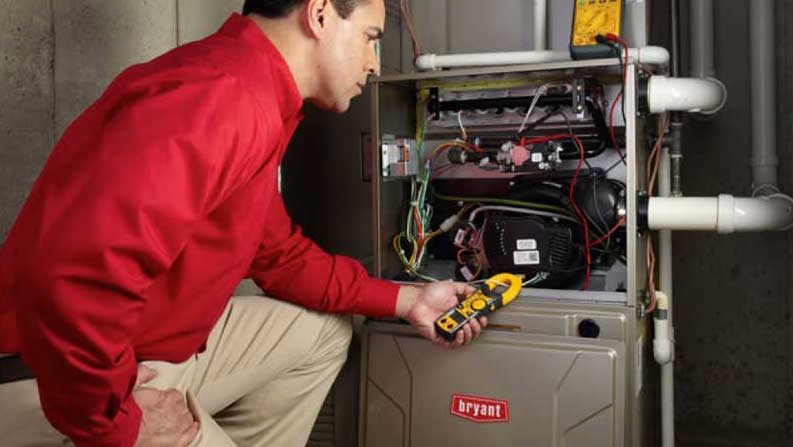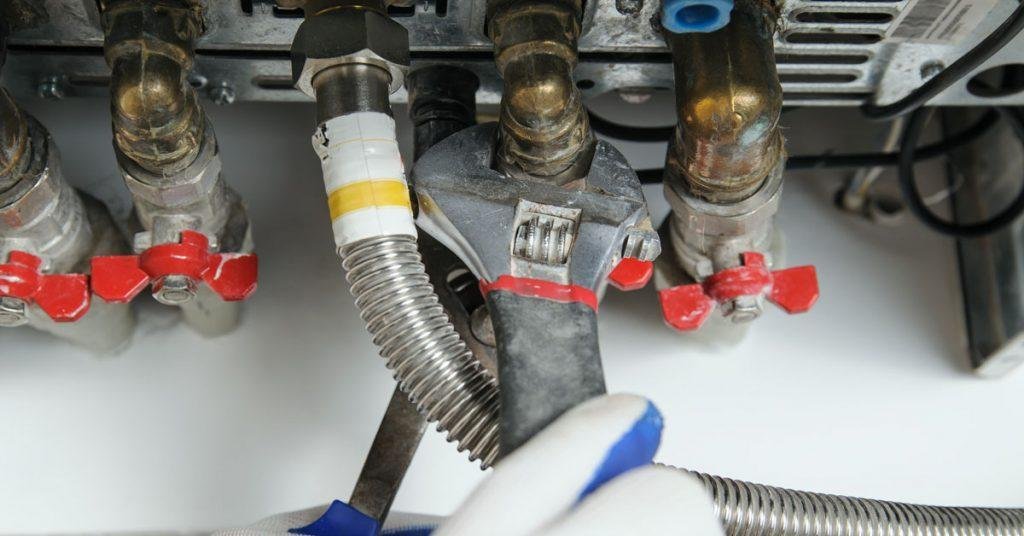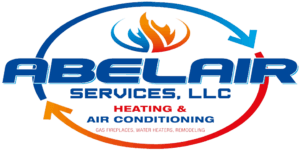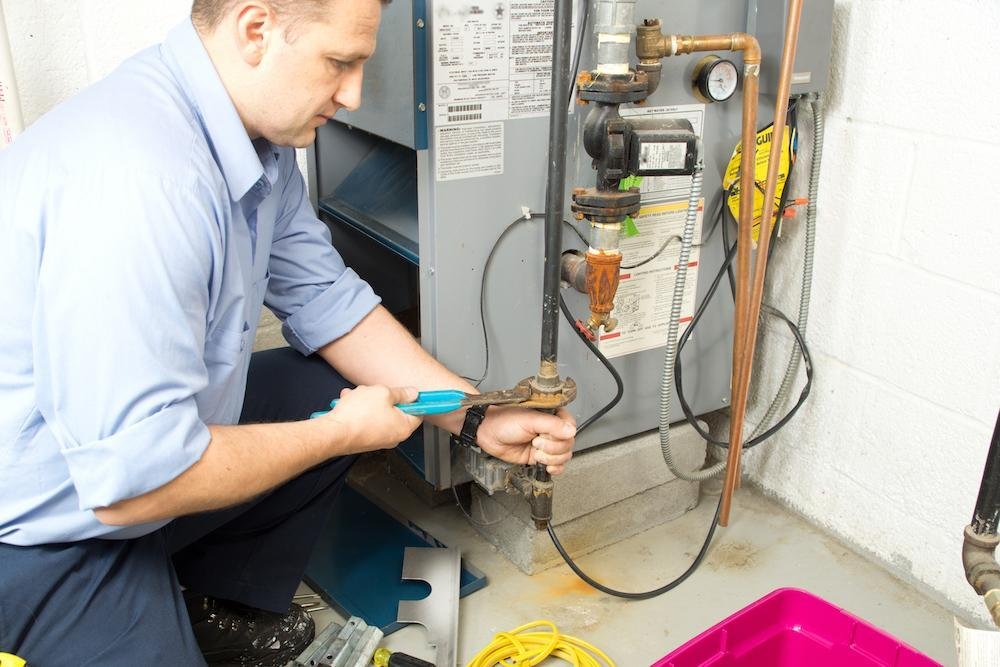Is Your Furnace Leaking Gas? Furnaces that burn natural gas are the most common type of home heating found in America. Consisting primarily of methane, natural gas has no odor in its unprocessed state.
Nevertheless, many homeowners experience smells—such as rotten eggs—that are potentially related to their furnace and are concerned about it.
Are gas-related smells to be expected with a gas-burning furnace?
The answer is not as simple as a yes or no, however, since smells in certain scenarios are to be expected while others are not.
The Smell Of Natural Gas
As we mentioned in the introduction, natural gas has no odor in its natural state. That could prove quite dangerous in residential environments, so utility companies mix in the chemical mercaptan.
Mercaptan is sulfur-based, and it creates a smell that many people associate with rotten eggs. Mercaptan is harmless to humans and pets, and the unsavory smell simply serves as a warning of gas leakage.
But it can crop up at other times as well, and smelling it does not necessarily mean that you have a gas leak.

Is My Furnace Leaking Gas?
Let us begin with the most hazardous scenario: a gas leak.
It is worth mentioning that furnace leaking gas are uncommon, but there is certainly the potential. If the smell of gas is strong and persistent, it is possible that you have a gas leak.
At this point, you have to make a judgment call. Is the danger of combustion imminent?
If so, leave the home immediately. If not, turn off the valve to the gas source, and open any windows that can be opened quickly and easily. Then, depart the home.
Once you are outside and at a safe distance from the home, call your local fire department. Next, call your gas company.
Once the issue has been identified, it may be necessary to call an HVAC technician in Virginia. Do so as soon as possible.
Most heating companies provide emergency services for such situations.
Furnace Leaking Gas: Carbon Monoxide Detection
Let us dispel a prevalent misconception: carbon monoxide detectors do not detect gas leaks.
If you would like gas leak detection added to your heating equipment, dedicated leak detectors are available that can identify even relatively minor seepage.
Nevertheless, carbon monoxide detection is important, and most residential building codes required CO detectors to be installed alongside gas-burning furnaces.
But keep in mind that you cannot smell CO. It is a byproduct of an incomplete burn, which can occur due to various furnace malfunctions. As CO levels increase, CO poisoning occurs.
This will eventually lead to suffocation, and CO is also combustible and can lead to a fire in the home.
Running Your Furnace For The First Time In This Season
There is a long stretch throughout the year during which your furnace goes unused.
What is almost unavoidable during this period is dust accumulating in and on the various components of your furnace. When you run the furnace for the first time in fall or winter, the dust is heated and eventually burns away.
The burning dust does not present much of a risk, but what it does do is react with the mercaptan that has been added to your natural gas. You may smell this odor not just near the furnace but coming through the vents.
Such smells are perfectly normal and nothing to be concerned about. If the smell lingers, then that can indicate an actual problem. If you would like to avoid these early-season odors, you can do so for the most part by having your furnace and your ducts cleaned.
In fact, the ideal scenario is to have a trusted heating technician in Virginia be the first one to fire up your furnace each season.
Regular Emission Of Gas
The average furnace cycle is 10 to 15 minutes, and depending on how cold it is outside, it may need to run twice or even thrice an hour to maintain the desired temperature.
When your furnace turns on and ignites, it is totally normal for it to emit an insignificant amount of gas each time. If you are standing in proximity to the furnace, then you may be able to smell the mercaptan.
Some people are more sensitive to the mercaptan than others, but the smell will be fleeting even for the most sensitive noses, and you will tend to have to sniff the air to detect it.
Note that this regular emission can be more problematic if the furnace is short cycling, which is a malfunction that demands furnace service as soon as possible.

Potential Exhaust Problems
If you smell gas not to the degree that would suggest a furnace leaking gas but on a regular basis, then the first place to look would be the furnace exhaust.
Furnaces have an exhaust pipe that is used to dissipate used natural gas from the home. Even high-efficiency furnaces are not 100-percent efficient.
The unused gas in the exhaust mixture will still have the mercaptan and thus still smell like rotten eggs. When the exhaust is functioning well, this is not a problem since the mercaptan quickly dissipates into the air.
However, there are scenarios where the exhaust can be redirected back into the home, which results in the smell.
Other Possible Odor Souces
Many people associate the smell of Mercaptan with the gas used for home heating, but there are other potential sources as well.
Garbage disposals and trash bins can be a common source of rotten egg smells. Clean your garbage disposal and remove all trash from the home.
Another potential source is compost. While compost bins are usually kept outdoors, if they are maintained near the home, the rotten egg smells can seep in.
Schedule A Furnace Inspection
If you have smelled gas or think you have a furnace leaking gas and are concerned, then the best way to get peace of mind is to schedule a furnace inspection in Virginia. This is particularly true if you are a homeowner who forgoes seasonal furnace maintenance and instead takes a break-fix approach.
Your technician will inspect the furnace, clean it and ensure that the natural gas is being combusted and exhausted as expected.
Schedule Seasonal Maintenance
Better yet, schedule seasonal maintenance. Many companies, including ours, offer maintenance agreements that help you save money and ensure that your furnace is inspected, cleaned and maintained each year.
Doing so extends furnace lifespan and ensures that your furnace is running well throughout the season. Homeowners who schedule routine maintenance often never smell gas at all.
THE PEACE OF MIND YOU DESERVE
Abel Air Services has served Virginia communities for nearly 20 years. Our company performs heating installation, maintenance and repair, and we offer maintenance agreements. We also install, maintain and repair cooling systems in Virginia, and we can install and program your smart thermostat.
Contact us online or call Abel Air Services today to learn more or to schedule an appointment.


